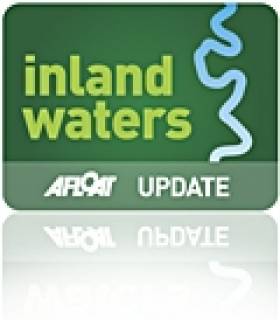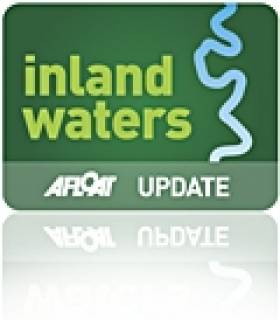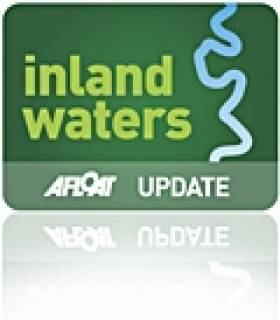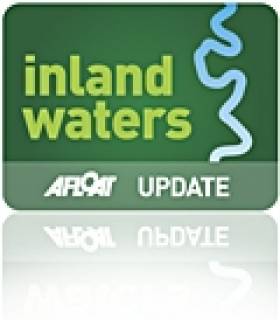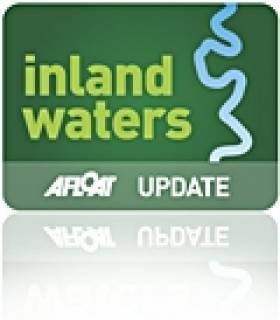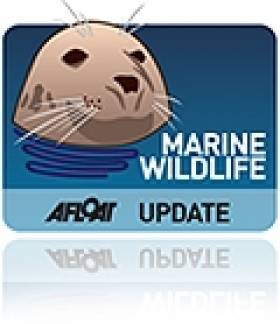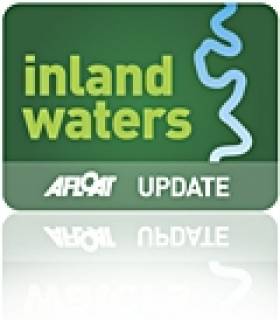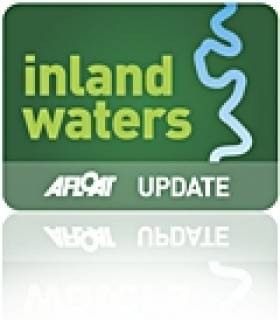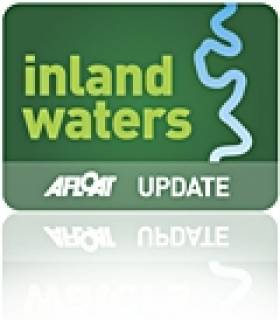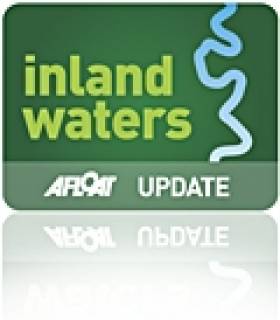Displaying items by tag: inland waterways
IFI Completes New Cross-Border Angling Project in Leitrim
#InlandWaterways - Inland Fisheries Ireland (IFI) marked the completion of an angling development project under the Interreg IVA Cross Border Harnessing Natural Resources Programme in Co Leitrim today (Friday 22 March).
The IFI project incorporated the development of angling facilities at two locations - Acres Lake in Drumshanbo and Herons Shore on Lough Allen - with the aim of harnessing the nature-based tourism potential of the region and fostering cross-border economic development.
IFI upgraded existing car parks and added additional car parking spaces, angler access points, information signage and floating fishing stands.
Speaking at the ribbon cutting ceremony, IFI board chair Brendan O’Mahony said: "The essential investment in programmes such as this one ensures the long-term sustainability of angling amenities for Ireland. It increases visitor numbers which in turn provides job opportunities and revenue for local communities.
"It also raises the standard of the angling experience for all levels of angler and ensures that the resource is accessible for all to enjoy”.
O’Mahony also commended the commitment of the drivers of such projects and their vision.
Recognising that the phase completed by IFI is only one part of the overall programme, IFI director Amanda Mooney commented that the fisheries body was "delighted to be given the opportunity to be part of the overall Harnessing Natural Resources Programme" and wished success to partner agencies on their own projects.
Grand Canal City Dredging Works Completed
#GrandCanal - Waterways Ireland has issued notice that dredging works on the Dublin Main Line of the Grand Canal between Portobello and Inchicore have now been completed.
As previously reported on Afloat.ie, the works between Lock C7 at Portobello and Lock 2 at Davitt Road were instigated to keep the canal navigable for a large range of boats.
The dredging works involved the removal of sediment deposits from the central navigation channel and the clearance of rubbish.
Meanwhile, major renovation works on the city terminus of the Grand Canal at Ringsend Basin are ongoing with a view to completion in mid May.
Accidental Pollution Leads To Fish Kill In Co Kerry
#FishKill - Accidental pollution from a farm in Co Kerry has resulted in a fish kill on a tributary of the Ballyline River.
Inland Fisheries Ireland were contacted by Kerry County Council on Saturday 16 March after being altered by a farmer to a slurry spill on his property in the Kilgarvan area of Ballylongford.
Upon arriving at the farm, IFI officers found one side of the slurry pit wall had collapsed, resulting in a large slurry spill. Two cattle were also injured in the incident and had to be put down.
The slurry went into a watercourse that eventually flows into the Shannon Estuary at Ballylongford Bay.
The farmer had carried out emergency measures on site attempting to contain the slurry and also trying to minimise the impact to fish and wildlife downstream.
Fisheries officers carried out a visual inspection downstream but as the slurry was still passing there was strong discolouration and so it was impossible to see any dead fish. Samples were taken and sent for analysis immediately.
The situation was monitored over the weekend, and a full walkover of the stream was carried out as the water cleared on Tuesday 19 March.
IFI can confirm that a fish kill took place as a result of the pollution incident, and that 150 brown trout, hundreds of stickleback, one eel and one flounder were recovered. The section of river downstream from the farm to Gortanacooka Bridge was the most heavily impacted.
Currently there is a buildup of organic sediment in the river from the farm to the first bridge in Graffa Bog, which IFI says will not disperse until there is a flood in the river.
The farm was also inspected on the evening of 19 March and the water within the watercourse was clear. The investigation continues.
NI Road Plans In Balance Over Salmon River Concerns
#InlandWaterways - Plans for one of Northern Ireland's biggest road schemes are in jeopardy after it emerged that construction could interfere with important salmon rivers.
As the Belfast Telegraph reports, High Court Justice Stephens said he was "minded" to put a stop to the A5 road project between Derry and South Tyrone as he found there had been a failure to carry out an impact assessment on the Special Areas of Conservation designated on the Rivers Foyle and Finn.
Both rivers are important for migrating salmon whose numbers are dwindling in Northern Ireland's waterways, despite reports of isolated surplus counts in areas like Lough Melvin.
The Department for Regional Development now has till next Friday to argue that the omission in their preparations should not prompt the quashing of plans for the new cross-border route.
The Belfast Telegraph has more on the story HERE.
Flow Measurements, Weir Inspection on Shannon
#InlandWaterways - Waterways Ireland advises that the Office of Public Works (OPW) is presently conducting flow measurements in Athlone and Banagher on the Shannon Navigation till Thursday 21 March 2013.
The measuring instrument will be lowered from the bridge to the river and then moved laterally across the bridge arches to take the measurements. The procedure will only take a matter of minutes at each arch.
Masters approaching the navigation arch of these bridges should be prepared to stop short and await instructions from OPW staff as to when it is safe to proceed through the arch.
Meanwhile, masters of vessels on the Shannon-Erne Waterway are advised that underwater inspection of weirs shall commence next Tuesday 19 March to be completed on Wednesday 3 April.
Masters approaching weirs should be prepared to stop short and await instructions from the dive safety officer before proceeding.
Seal Causes A Splash In Freshwater Lake
#MarineWildlife - The Irish Examiner reports that a seal has been spotted some 24km inland from the coast in the lakes of Killarney.
The rare sighting was made near Muckross Abbey last week by angler Mike O'Sullivan, who couldn't believe his eyes when he first spotted the marine mammal.
"People mix up seals and otters," he said. "But when I looked through ... binoculars it was a seal. In all my time on the lake, I never saw a seal.”
It's believed the common or harbour seal migrated to the inland lakes via the River Laune from Castlemaine Harbour.
And it's not the first time a seal has been spotted far from its usual habitat in these islands.
In January it was reported that a seal had travelled more than 80km from the Norfolk coast to the Fen Drayton lakes in Cambridgeshire. The Guardian has video of the intrepid explorer HERE.
IFI Addresses EU Parliament on Invasive Alien Species
#InvasiveSpecies - Dr Joe Caffrey of Inland Fisheries Ireland (IFI) presented Ireland’s position on the threat of invasive alien species to Ireland's waterways at a high-level debate at the European Parliament in Brussels on 21 February last.
Discussions centred on the issue of invasive alien species in Europe and the development of an EU policy instrument to tackle the threats.
The debate, titled ’Biodiversity’s Ticking Time Bomb: Understanding and Addressing the Problem of Invasive Species in Europe’, was organised via the International Union for Conservation of Nature (IUCN) and Birdlife, with the support of the European Habitats Forum.
Dr Caffrey was one of nine speakers who presented to the large gathering where he addressed the theme ‘The challenges and opportunities of member states in implementing EU legal measures: the example of Ireland’.
The talks were followed by a highly interactive panel discussion during which the pros and cons of a dedicated EU legislative instrument on invasive alien marine species were debated. The results of EU deliberations on this theme will emerge in the coming months when a consultation document will be released.
In the meantime, IFI and EIFAAC will host the FINS (Freshwater Invasives – Networking for Strategy) Conference in Galway on 9-11 April which will address key topics relating to freshwater invasive species and harmful aquatic pathogens.
The conference is attracting a large international audience of policy makers in this area. The primary objective of the conference is to provide a forum where international scientists, policy makers and stakeholders will address designated themes with a view to informing management and policy development in this increasingly important area.
Minister Fergus O'Dowd, who recently launched the world's first angling kit to combat invasive species, said of the conference: “Invasive species cause some €12.5 billion worth of damage each year in the European Union alone and are a serious threat to native biodiversity across the continent. IFI is keenly aware of the threat to our own natural resources, particularly to our economy, health and recreational activities.
“I want to congratulate IFI on the lead it has taken in its scientific, practical and proactive approach to this issue, working with stakeholders on the front line to ensure that biosecurity awareness is paramount. They are also bringing Ireland’s first-hand experience to Europe and adding to the positive debate on an EU wide cooperative framework to safeguard our natural resources through legislation and knowledge transfer."
The FINS conference will be held at the Galway Bay Hotel and Conference Centre in Salthill, Galway, Ireland from 9-11 April 2013. For more details visit the FINS Conference website.
River Dodder Fish Kill Investigation Continues
#FishKill - Inland Fisheries Ireland (IFI) staff are continuing their investigation into the deaths into some 500 freshwater fish in the River Dodder late last week.
The fish kill is now thought to cover a 2km stretch of the river in the Tallaght area of south Dublin, and species affected include adult and juvenile brown trout, lamprey and stoneloach.
According to the IFI, live fish were recorded immediately upstream and downstream of the affected area.
As previously reported on Afloat.ie, the fisheries body is following a definite line of enquiry regarding the source of the contamination that caused what Redmond O'Hanlon of the Dodder Anglers Group called the worst fish kill he had witnessed "in 30 years".
#shannon – The winter mooring period on the Shannon Navigation and Shannon-Erne ends on Sun 31 Mar 2013 thereafter Navigation Bye-law No. 17(3) applies. Vessels should not berth in the same harbour for longer than the statutory period of five consecutive days nor more than a total of 7 days in any one month.
Fish Kill in Tallaght Investigated
#InlandWaterways - Reports indicate that as many as 500 freshwater fish of various species have been found dead in the River Dodder in Tallaght, south Dublin.
The fish kill was discovered on Friday evening upstream of the Old Bawn bridge, and according to the Irish Independent, Inland Fisheries Ireland says samples have been taken from the scene - and that a possible source has been identified.
However, the fisheries body refused to comment on speculation that the fish kill was a result of discharge from industrial waste or illegal dumping.
The fish kill covers a 600-metre stretch of the river in the south Dublin suburb.
Speaking to The Irish Times, Redmond O’Hanlon of the Dodder Anglers Group said it is the worst fish kill he has witnessed "in 30 years".



























